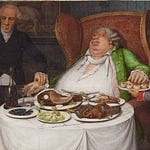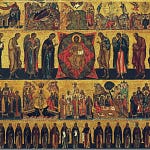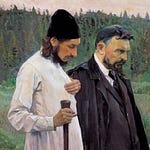While many Orthodox Christians have already celebrated the birth of Christ on December 25 according to the Gregorian calendar, along with Roman Catholic and Protestant Christians, by most estimates, many more Orthodox around the world - most, in fact - continue to observe the Nativity fast in preparation for the Christmas celebration on January 7 on the Gregorian calendar / December 25 on the Julian calendar. (For more information on calendars, see our previous post.) And by most estimates, the Orthodox of any calendar persuasion observe a fast of some kind for more than two thirds of a year.
To be sure, the nature and strictness of fasting greatly depend on ethnic, cultural, and local traditions, health conditions, personal preferences, and opinions of individual lay Christians and clergy. Most people, however, agree that at a minimum, fasting includes abstinence from meat. Popular beliefs concerning the reasons for this abstinence are quite murky and range from some notion that meat dishes are best fitting for celebrations to an idea that we partake of animal passions when we eat meat. Naturally, such beliefs - as most popular beliefs - raise more questions than provide answers. A hard-working man eating a cheap turkey sandwich he bought for his lunch at a gas station is hardly celebrating in the same way as someone who roasted a whole pig for his daughter’s wedding, or even as someone who enjoys a vegan tofurky instead of the pig, or who baked a filet of Copper River king salmon - even if with olive oil instead of butter.
Likewise, when it comes to passions, it seems that cows, as an example, are a lot less passionate than humans, and we should eat more beef during our fasts in order to attain their serenity and contentment. Some say that Adolf Hitler and many top Nazi officials were vegetarians - at least, for some time during World War II, but few would argue that this type of fasting helped them conquer their passions. Likewise, if most people living in India abstain from eating meat, persistent reports of gang rapes coming from that country are not particularly indicative of a state of passionlessness achieved through the traditional Hindu diet.
Listen to this episode with a 7-day free trial
Subscribe to Phroneo to listen to this post and get 7 days of free access to the full post archives.












